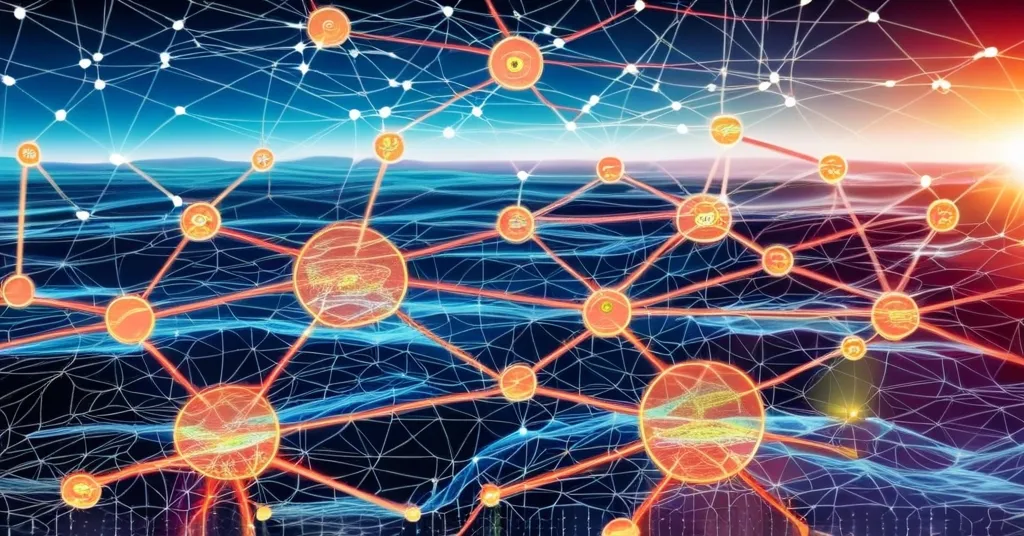The Graph Launches Geo Genesis: A New Era for Decentralized Knowledge Sharing in Web3

The Graph’s Geo Genesis: Pioneering Decentralized Knowledge Sharing in Web3
The Graph, a trailblazer in decentralized data indexing, has launched Geo Genesis, a platform that aims to revolutionize knowledge sharing in the web3 space. By enabling users to contribute and govern knowledge through collaborative hubs known as “Spaces,” Geo Genesis seeks to democratize access to information, inviting everyone from crypto novices to tech wizards to participate.
- The Graph introduces Geo Genesis for web3 knowledge sharing
- Accessible to users of all technical expertise
- Utilizes collaborative hubs called “Spaces”
- Built on GRC-20 and Aragon OSx frameworks
- Currently in early access phase
Geo Genesis is not just another app; it’s a bold move towards empowering communities to take control of their digital knowledge landscape. Built on The Graph’s GRC-20 data standard, this platform offers unprecedented interoperability and adaptability. The GRC-20 standard, akin to ERC-20 for value on Ethereum, is a framework designed to structure and share knowledge across decentralized applications, enhancing the ability to work with different systems and adapt to new needs. The Aragon OSx framework further boosts Geo Genesis’s accessibility, making it a versatile tool for anyone looking to explore decentralized knowledge management.
The structure of Geo Genesis revolves around “Spaces,” where users can manage, share, and govern knowledge. These Spaces are governed by two roles: Editors and Members. Editors hold the power to govern votes, ensuring that the content remains relevant and trustworthy, while Members contribute to the Spaces, fostering a vibrant community-driven ecosystem. This governance model echoes the ethos of decentralization and effective accelerationism, pushing the boundaries of what’s possible in the digital realm.
Currently in its early access phase, Geo Genesis invites users to join and contribute to its Spaces. Early examples have shown Editors curating crypto news, demonstrating the platform’s potential to create dynamic, community-curated knowledge graphs. This not only challenges the status quo of centralized information but also champions the cause of privacy and freedom in the age of digital content.
Since its inception in 2018, The Graph has expanded its reach to over 80 blockchains, including Ethereum, Avalanche, Arbitrum, Optimism, and Base. The launch of Geo Genesis marks a significant milestone in this journey, as it transitions from being just a data indexing protocol to a comprehensive platform for decentralized knowledge sharing and community engagement. While some might argue that this diversification dilutes The Graph’s focus on blockchain data, it’s clear that Geo Genesis complements rather than competes with The Graph’s core mission, offering a new avenue for growth and innovation.
As the crypto world often falls prey to hype and unrealistic promises, Geo Genesis stands out as a practical application of blockchain technology. It’s not about moonshots or lambos; it’s about building a more open, accessible, and decentralized internet. However, it’s crucial to acknowledge that Geo Genesis, like any early-stage project, faces challenges, including ensuring the quality and accuracy of user-generated content and navigating the complexities of decentralized governance.
While Geo Genesis promises a new era of decentralized knowledge sharing, it’s important to consider potential limitations. For instance, the platform’s success hinges on user adoption and engagement, which can be unpredictable in the volatile world of crypto. Additionally, the challenge of maintaining high-quality content in a decentralized environment cannot be understated. Yet, if Geo Genesis can overcome these hurdles, it could set a new standard for how knowledge is shared and governed in web3.
Key Takeaways and Questions
- What is Geo Genesis?
Geo Genesis is a new application launched by The Graph, designed to decentralize and democratize web3 knowledge sharing through collaborative hubs called “Spaces.” - Who can use Geo Genesis?
Geo Genesis is accessible to users of all levels of technical expertise, aiming to make knowledge sharing inclusive. - What is the role of the GRC-20 data standard in Geo Genesis?
The GRC-20 data standard provides a framework for unified knowledge graphs, enhancing interoperability, adaptability, and composability within Geo Genesis. - How is governance structured in Geo Genesis?
Governance in Geo Genesis involves two roles: Editors, who hold governance votes, and Members, who contribute to Spaces. - What is the current status of Geo Genesis?
Geo Genesis is currently in its early access phase, with request invites available for those interested in joining and creating Spaces. - What are some of the blockchains where The Graph has been adopted?
The Graph has been adopted on over 80 blockchains, including Ethereum, Avalanche, Arbitrum, Optimism, and Base. - What does the launch of Geo Genesis mean for The Graph’s growth?
The launch of Geo Genesis represents a significant step in The Graph’s growth, expanding its utility from blockchain data indexing to decentralized knowledge sharing and community engagement.
“Geo Genesis is The Graph’s solution that will empower communities to decentralize knowledge sharing.” – The Graph’s press release.
As we continue to witness the evolution of web3, platforms like Geo Genesis are crucial in realizing the vision of a decentralized, user-driven internet. While the path forward may be fraught with challenges, the potential to disrupt the status quo and foster a new era of digital freedom and privacy is immense. Let’s keep an eye on Geo Genesis as it navigates the exciting yet unpredictable waters of web3 innovation.



